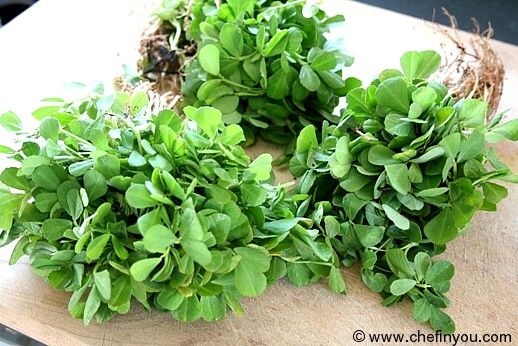
Alternate Names
Fenugreek is also known as Methya (in Marathi), menthya (in Kannada), Vendayam (in Tamil), Menthulu (in Telugu), Uluva (in Malayalam) , Uluhaal ( in Sinhalese), Methi ( (In Oriya,Bangla, Punjabi, Urdu and Hindi). In Persian it is Shanbalîleh, and in Arabic its name is Hilbeh.
Fenugreek is also known as Methya (in Marathi), menthya (in Kannada), Vendayam (in Tamil), Menthulu (in Telugu), Uluva (in Malayalam) , Uluhaal ( in Sinhalese), Methi ( (In Oriya,Bangla, Punjabi, Urdu and Hindi). In Persian it is Shanbalîleh, and in Arabic its name is Hilbeh.
What is Fenugreek?
Fenugreek belongs to the plant family “Fabaceae”. It is available and used both as a herb (the leaves of the plant) and as spice (the seed). It is cultivated worldwide as a semi-arid crop. It is frequently used in curry and is a very famous Indian leafy vegetable which resembles clover leaves. It has a very light bitter taste (which might require getting used to) and has a spicy taste to it.
Fenugreek belongs to the plant family “Fabaceae”. It is available and used both as a herb (the leaves of the plant) and as spice (the seed). It is cultivated worldwide as a semi-arid crop. It is frequently used in curry and is a very famous Indian leafy vegetable which resembles clover leaves. It has a very light bitter taste (which might require getting used to) and has a spicy taste to it.
How to Prepare Fenugreek Leaves
The fresh leaves undoubtedly have lots of mud and debris in them. Hence cleaning is v essential. Before that, chop off the roots of the leaves.
The fresh leaves undoubtedly have lots of mud and debris in them. Hence cleaning is v essential. Before that, chop off the roots of the leaves.
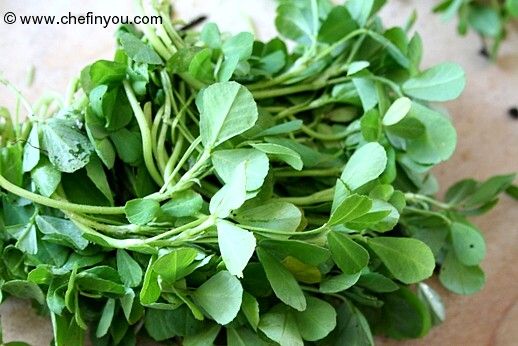
Pick the leaves of the stem. Very tender stems can be left in.

Wash very well in cold water. It might take time but you don’t want mud in your food. Its worth it though.
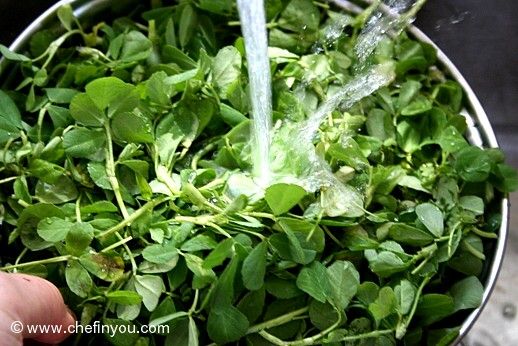
Chop it lightly and coarsely. You can now use this in varied recipes.
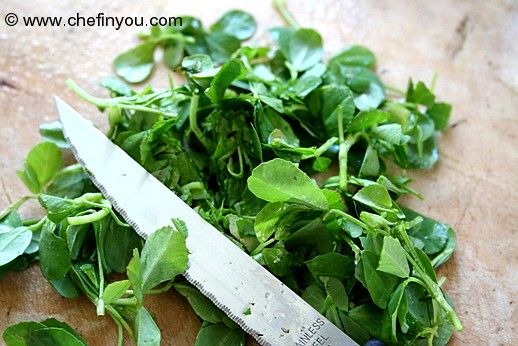
These are mostly available in Indian stores. The fresh leaves can be hard to come by in which case try checking the freezer section. Many Indian stores now carry the frozen version of the same. The frozen can be a boon in the sense it cuts out the preparation time (which can be quite time consuming depending in the amount you plan to use). Simply thaw and use it in the recipe.
Different Types and Availibility
Fenugreek is mainly available in 3 forms:
1. Fenugreek leaves
2. Dried Fenugreek leaves (also commonly referred to as Kasuri Methi)
3. Seeds
Fenugreek is mainly available in 3 forms:
1. Fenugreek leaves
2. Dried Fenugreek leaves (also commonly referred to as Kasuri Methi)
3. Seeds
Almost all Indian stores would definitely carry the dried Fenugreek and the seed since they are essential Indian spices used commonly in the cuisine. The fresh leaves may be hard to come by in which case check for frozen leaves (nowadays quite a common sight in the Indian shops) or substitute with the dried version ( 1/3 rd of the original amount)
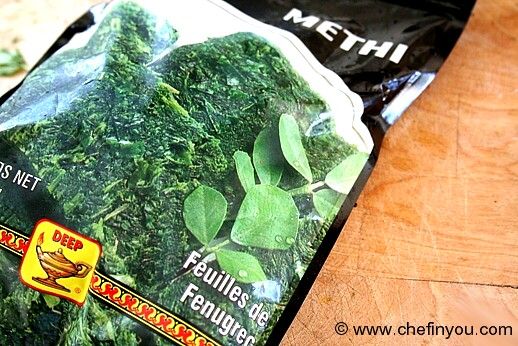
The Fenugreek seeds play a intimate role in so many dishes in the Indian cuisine. Be it from aromatic powders, or simple day to day lentil dishes to the extent of adding a special touch to traditional rice recipes. The seeds can be sprouted and enjoyed in salads, can be seeped in hot water and enjoyed as Tea, so on and so forth,
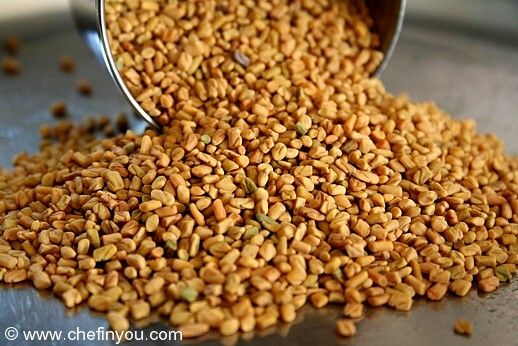
Benefits of Fenugreek
The benefits are multitude. The seeds have been found to contain protein, vitamin C, niacin, potassium, and diosgenin (which is a compound that has properties similar to estrogen). Due to its estrogen-like properties, fenugreek has been found to
- help increase libido and lessen the effect of hot flashes and mood fluctuations that are common symptoms of menopause and PMS.
- to treat arthritis, asthma, bronchitis, improve digestion,
- maintain a healthy metabolism, increase libido and male potency,
- to cure skin problems (wounds, rashes and boils),
- to treat sore throat, and cure acid reflux.
Fenugreek also has a long history of use for the
- treatment of reproductive disorders,
- to induce labor,
- to treat hormonal disorders,
- to help with breast enlargement, and
- to reduce menstrual pain.
Recent studies have shown that Fenugreek helps lower blood glucose and cholestrol levels, and may be an effective treatment for both type 1 and 2 diabetes. Fenugreek is also being studied for its cardiovascular benefits.
What are the Side Effects of Fenugreek?
It is generally considered safe when used moderately although there have been reports which mention few very minor side effects.
- Nausea
- gastrointestinal discomfort (diarrhea and/or gas)
- Use of fenugreek is not advised if you are pregnant since its known to induce labor. Consult with your doctor.
- If you are consuming any oral medications then it is important to use fenugreek at least 2 hours before or after these drugs since the fiber in Fenugreek has the potential to interfere with the absorption of oral medications due to its mucilaginous fiber (which gives it a moist and sticky texture).
- gastrointestinal discomfort (diarrhea and/or gas)
- Use of fenugreek is not advised if you are pregnant since its known to induce labor. Consult with your doctor.
- If you are consuming any oral medications then it is important to use fenugreek at least 2 hours before or after these drugs since the fiber in Fenugreek has the potential to interfere with the absorption of oral medications due to its mucilaginous fiber (which gives it a moist and sticky texture).
Substitutes for Fenugreek
Dried leaves, either whole or ground are a good substitute for fresh. Replace with half the qty of fresh. If both are not available the one closest would be celery leaves since it also has a slight bitter taste similar to Fenugreek. You can also use chopped watercress leaves. For the seeds, substitute 1 tsp fenugreek seeds with 1 tsp yellow mustard seeds.

No comments:
Post a Comment